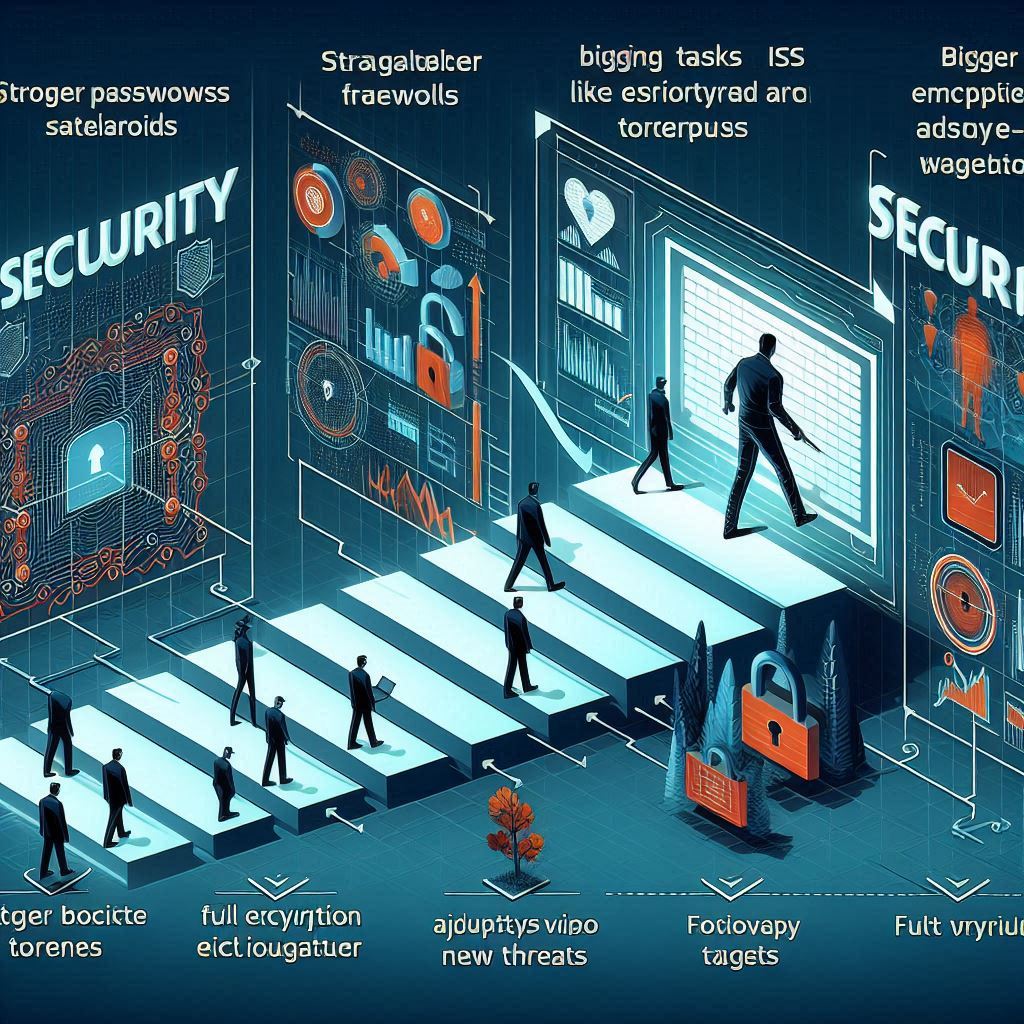
Preparing a penetration test (pentest) is a complex process that requires careful planning and coordination. A well-planned pentest can not only help to identify security vulnerabilities in IT systems, but also significantly improve an organization’s overall security posture. In this article, we provide you with a detailed checklist for pentest preparation and explain how you can best prepare for a penetration test. We also highlight common challenges and provide practical tips and a guide to implementation.
What is a Penetration Test?
Why is a Penetration Test necessary?
A penetration test (pentest) is not just any routine assessment—it is a critical, ongoing process that should be performed at regular intervals. Software is dynamic, and new libraries and updates are developed every day, particularly those integrated into your company’s systems. Just as people age, software evolves over time, with frequent updates being made to address discovered vulnerabilities. As these vulnerabilities emerge, they must be identified and mitigated promptly. A notable example of such a vulnerability is the Log4J issue in Java’s logging library, which received widespread attention for its security implications.
However, vulnerabilities are not only introduced through libraries. In many cases, the root cause of security flaws lies in the lack of focus on security during the development phase. It is often claimed that there is insufficient time to address security concerns or that developers overlook security altogether. While assigning blame is not productive, companies must prioritize security, even if it requires additional resources. Investing in robust security measures is essential, as the cost of repairing reputational damage far exceeds the expense of conducting a pentest.
Ultimately, the goal of a penetration test is to identify as many critical and non-critical vulnerabilities as possible, mitigating the risk of severe damage. This proactive approach can save significant costs in the long term, as the consequences of a breach can be far more expensive than performing regular penetration tests. It is also important to note that multiple non-critical vulnerabilities can, when combined, create a “kill chain” that leads to a major security incident.
Here are additional reasons why penetration testing is essential:
- Early Detection of Hidden Vulnerabilities: Uncovering vulnerabilities before malicious hackers can exploit them is crucial to preventing breaches.
- Minimizing Error Messages and Downtime: Exploited vulnerabilities can lead to infrastructure downtime, resulting in significant revenue loss. Penetration testing helps reduce the risk of such incidents.
- Protecting Customer and Employee Data: Data breaches erode trust and can lead to legal ramifications. Securing sensitive information is paramount for maintaining business reputation and compliance.
- Reducing Recovery Costs: In the event of a successful attack, restoring infrastructure can be costly, especially if backups are compromised or unavailable. A penetration test helps mitigate the likelihood of such attacks, saving time and resources.
Types of Penetration Tests
Penetration tests can be conducted at three distinct levels, each offering a different approach and scope. These are classified as black-box, grey-box, and white-box tests, as illustrated below:
1. Black-Box Penetration Test: A black-box test simulates a real-world attack scenario where the pentester has no prior knowledge about the system being tested. The focus is on assessing external and internal infrastructures with minimal organizational involvement. The pentester operates as an outsider, aiming to identify critical vulnerabilities and cause as much simulated damage as possible. This type of test is valuable for understanding how an external attacker might exploit weaknesses in a system.
2. Grey-Box Penetration Test: A grey-box test occurs within a defined scope, where the pentester is provided with limited information about the target system. This may include access to certain credentials or partial system knowledge, enabling the pentester to focus on specific aspects of the infrastructure. The advantage of this approach is that it allows for a more targeted investigation, providing the pentester with the opportunity to explore deeper into potential vulnerabilities that may not be apparent during a broader, less focused test.
3. White-Box Penetration Test: The white-box test is the most comprehensive level, where the pentester is granted full access to all relevant internal resources, including source code, documentation, and system architectures. With complete visibility into the system’s structure, the pentester can identify both technical and logical vulnerabilities. For example, a logical vulnerability could allow unauthorized actions, such as making a purchase on a marketplace platform without being logged in as the correct user. This in-depth access enables the pentester to uncover complex issues that may not be easily detected through other types of testing.
Step 1: Inform important employees

Inform the IT department about the upcoming penetration test to avoid unpleasant surprises and ensure readiness. Designate a member of the IT team as the main point of contact for the penetration testers. Ensure that the entire IT team is available and ready to provide the necessary system access and technical support during the test.
Risks of non-fulfillment:
If this step is not fulfilled, unexpected disruptions to IT operations may occur. Uninformed employees may react to test results with confusion or concern, which can lead to a loss of confidence in the security measures. In addition, a lack of access rights or technical support could hinder the testing process and lead to incomplete or misleading results. Ultimately, this could jeopardize the company’s security posture and take up valuable resources unnecessarily.
Step 2: Putting together a response team

Form an interdisciplinary response team consisting of members from the IT department, the security department, the business units and the compliance management teams. This team should carefully review and analyze the test results. Ensure that representatives from different areas of the organization – including security, management and compliance – are available to respond to the test results in a timely manner.
Risks of non-fulfillment:
Failure to follow this recommendation can have serious consequences. Without a qualified response team, there could be delays in analyzing and remediating security vulnerabilities. Inadequate communication between departments can lead to a lack of clarity about the priority and scope of identified risks. This could lead not only to ineffective response strategies, but also to an increased risk of security incidents. As a result, the company could lose valuable information and resources, as well as risk legal and regulatory consequences as a result of inadequate compliance policies.
Step 3: Preparation for possible downtimes

Schedule the penetration test during off-peak hours to minimize business disruption. Develop contingency plans and create backups in case critical systems fail during testing. Inform all relevant teams and stakeholders about the test plan and the possibility of interruptions well in advance.
Risks of non-fulfillment:
Failure to adhere to these preparations can have a significant impact on the penetration test and overall business continuity. If the test is carried out at peak times, this can cause significant disruption to operations, which could have a negative impact on productivity and customer service. In the absence of contingency plans or backups, there is a risk of an unforeseen system failure, which could lead to data loss or extended downtime. This could not only jeopardize the penetration test, but also affect the confidence of stakeholders and customers in the company’s IT security.
Step 4: Avoid last-minute security adjustments

Avoid last-minute changes to the systems that are the subject of the penetration test to ensure the accuracy of the test results. Fix known critical issues, such as unpatched software or outdated systems, well in advance of the test date.
Risks of non-fulfillment:
Ignoring these recommendations can significantly compromise the integrity of the penetration test. Last-minute changes can introduce unexpected vulnerabilities or mask existing issues, leading to misleading test results. If critical issues such as unpatched software or outdated systems are not addressed in a timely manner, you risk overlooking vulnerabilities that could potentially be exploited. This could significantly weaken the company’s ability to effectively detect and respond to security incidents and ultimately jeopardize the entire security architecture.
Step 5: Define the objectives of the penetration tests

Clearly define the objectives of the penetration test to ensure that it is both effective and meets the needs of the organization.
- Compliance requirements: Verify that the test meets relevant standards, such as PCI DSS or HIPAA, if required.
- Focus areas: Identify specific systems, services or functions that need special attention.
- Stealth testing: Determine whether the test should include elements of the stealth approach to test how your security team responds to attacks without being notified in advance.
- Sensitive systems: Clarify whether particularly critical systems, such as medical devices or infrastructure components, should be included in the test.
- Pivoting: Determine the extent to which testers should be able to switch between systems (pivoting) when vulnerabilities are identified.
Risks of non-fulfillment:
Failure to define clear objectives for the penetration test can lead to a variety of problems. Without defined compliance requirements, the test may not meet legal requirements, which can have legal consequences. Insufficient focus on specific systems or services can lead to critical vulnerabilities being overlooked, jeopardizing the company’s security. In the absence of stealth elements, the security team’s ability to respond to real attacks may not be adequately tested. In addition, including highly critical systems in the test without clarifying the appropriate safeguards can lead to significant risks. Finally, the lack of clear pivoting guidelines can lead to testers entering unexpected areas, which could jeopardize the integrity and availability of the systems.
Step 6: Scope of the penetration test

Define the scope of the penetration test clearly and precisely to ensure effective execution.
- In-scope systems: Create a detailed list of all networks, systems, applications and segments that are part of the test.
- Excluded systems: Specify any systems or networks that are excluded from the test to avoid accidental disruption or data loss.
- Test type: Decide whether a gray box test (with limited insider access) or a black box test (without prior knowledge) should be performed.
- Test environment: Confirm whether the test should take place in a production or staging environment.
Risks of non-fulfillment:
Failure to clearly define the scope of the penetration test can lead to significant complications. Without a precise list of in-scope systems, there is a risk that important areas will not be tested, leaving potential security vulnerabilities undetected. Missing exclusions could result in unintended disruptions to critical systems, which could impact business operations and potentially lead to data loss. In addition, choosing the wrong type of test can lead to inaccurate results, as different approaches illuminate different perspectives and attack vectors. Finally, conducting the test in a production environment without proper preparation can jeopardize system availability and disrupt ongoing operations, while testing in a staging environment may not reflect real-world conditions.
Step 7: Test access and authorizations

Make sure that access to the test systems and the corresponding authorizations are clearly defined to ensure that the penetration test runs smoothly.
- Network access: Specify how the testers will access the network, e.g. via VPN or special user accounts.
- Provided credentials: Ensure appropriate user accounts are provided for the test, including administrative and user-defined access rights.
- Firewall and WAF customizations: Ensure that the testers’ IP addresses are categorized as allowed in your firewall or Web Application Firewall (WAF) to avoid unexpected blocking during the test.
- Third-party systems: If the systems being tested are hosted by a third party, ensure that written permission is obtained to conduct the penetration test during the designated time period.
Risks of non-fulfillment:
Failure to establish clear test access and authorization requirements can lead to significant problems during penetration testing. Without defined access paths, testers may be unable to access the necessary systems, leading to incomplete results. Insufficiently provided credentials can lead to testers working on system levels that do not meet the desired security requirements, which affects the validity of the test results. In addition, the lack of appropriate adjustments in the firewall or WAF could result in testers being blocked during the test, which can significantly disrupt the execution. Finally, the lack of written authorization for third-party systems can have legal and contractual consequences and make the test illegal, which could put the company in a legal dilemma.
Step 8: Preparing web applications and services

Prepare the web applications and services thoroughly to maximize the effectiveness of the penetration test.
- User accounts: Provide at least two user accounts for each relevant role (e.g. for normal users and administrators) to comprehensively test the escalation of rights.
- Administrative access: Make sure that an administrative account is available for the tests to check the full functionality of the applications.
- Test environment: Confirm whether the test will be performed in the production environment or in a test environment and whether the test team has exclusive access to the required resources.
- Web services: Provide project files for SOAP UI or Postman or at least examples of valid service requests (HTTP) to make it easier for the testers to access the web services.
Risks of non-fulfillment:
Failure to adequately prepare web applications and services can significantly impact the effectiveness of the penetration test. Without sufficient user accounts, privilege escalation analysis may be incomplete, resulting in potential vulnerabilities not being detected. If an administrative account is missing, it may be impossible for testers to check critical functions and security measures of the application, which jeopardizes the validity of the test results. Running the test in a production environment without proper isolation can lead to unexpected disruptions in operations. Finally, insufficient information about web services can result in testers not being able to analyze the services efficiently, which can reduce the quality and validity of the test results. This could ultimately undermine confidence in the security of the organization’s web applications and services.
Step 9: Definition of time restrictions and communication strategies

Define any time constraints for the penetration test to ensure that the test runs smoothly and potential disruptions are minimized.
- Time constraints: Define the business hours and planned downtime within which the test may be conducted.
- Emergency contacts: Designate two emergency contacts (one primary and one backup) who will be available 24/7 during the test to ensure immediate support if needed.
- Secure communication channel: Set up a secure communication channel that enables the exchange of test updates and sensitive information to maintain confidentiality.
- Update frequency: Determine how often and in what format the test team should provide progress reports on the test to ensure transparent communication.
Risks of non-fulfillment:
Failure to clearly define time constraints and communication strategies can lead to significant problems during penetration testing. Unclear timeframes can lead to tests being carried out at inconvenient times, which can disrupt business operations and lead to unexpected downtime. Lack of emergency contacts could lead to delays in problem resolution in the event of a crisis, which can exacerbate potential security incidents. In addition, the use of insecure communication channels can increase the risk of data leaks and jeopardize the integrity of sensitive information. Without regular progress reports, there is a risk that stakeholders are not aware of the status of the test, which can undermine confidence in the testing process and reduce responsiveness to issues as they arise.
Step 10: Review and finalize the Rules of Engagement

Define the “Rules of Engagement” (RoE) for the penetration test to ensure that everyone involved has clear guidelines and that critical issues are handled appropriately.
- Instructions for dealing with critical issues: Specify how testers should proceed when critical security issues are discovered, for example by immediately notifying the responsible contacts.
- Use of exploit code: Ensure that only stable and proven exploit code is used during testing to avoid undesirable effects on systems.
- Handling sensitive data: If sensitive data is discovered, testers must be careful to extract only as much information as is absolutely necessary to demonstrate the risk without jeopardizing the confidentiality of the data.
- Documentation of exceptions: Keep a written record of any exceptions to the standard rules of engagement to avoid misunderstandings and make the test transparent.
Risks of non-fulfillment:
Failure to properly review and finalize the Rules of Engagement can lead to serious consequences. If it is not clearly defined how critical issues should be handled, there is a risk that security incidents are not reported in a timely manner, which can lead to an escalating threat. The use of unstable exploit code could potentially destabilize systems or lead to outages, which can impact business operations. Inadequate handling of sensitive data could lead to data breaches that not only result in legal consequences, but also jeopardize customer and stakeholder trust. Finally, the lack of documentation of exceptions can lead to confusion and inconsistency in the testing process, which negatively impacts the quality and credibility of test results.







